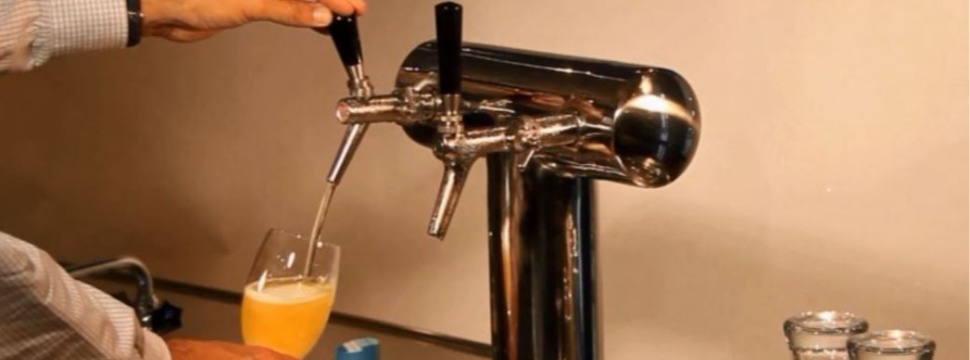Brewery losses of historic dimensions - Industry survey by the German Brewers Association on the impact of the Corona pandemic
News General news
Intensified by the renewed lockdown in place since the beginning of November, the sales losses and revenue declines of German breweries for 2020 are reaching historic dimensions. "The situation is dramatic and unprecedented in the post-war period," says the chief executive of the German Brewers Association (DBB), Holger Eichele. According to a current industry survey by the DBB, more and more medium-sized and craft breweries are reporting drastic and not infrequently existence-threatening drops in sales. "The larger a brewery's hospitality and event business, the more devastating the losses."

Historic slump in beer sales and revenues
While some breweries that sell a very small percentage of their beers in the foodservice industry report no or only single-digit declines in sales, the bulk of operations are lamenting massive drops, in some cases as much as 70 percent from the previous year in 2019, resulting in large losses that will take years for the operations to recoup. On average, the breweries surveyed by the DBB with beer and beer-mixed beverages had 23 percent lower sales last year than in the previous year. The annual report from the Federal Statistical Office at the end of January will show the extent to which beer sales, measured in hectoliters, have collapsed nationwide. According to the association's survey, smaller businesses with up to 30 employees in particular, which are usually hit harder than average by the lack of catering sales and the cancellation of festive events, are complaining of sales declines of 50 percent and more. Only very few breweries, which offer their beers mainly or exclusively through the on-trade, were able to maintain the previous year's level in 2020.
Across all breweries surveyed, the sample showed a drop in sales averaging 19 percent. The Brewers Association had surveyed more than 80 breweries of all sizes between December 16 and January 13. Just under a quarter of the companies have fewer than 30 employees, and another quarter have up to 60.
22 percent of the breweries surveyed have between 60 and 100 employees, 17 percent between 100 and 300 employees, and finally a good ten percent have more than 300 employees. This survey thus once again provides an up-to-date picture of the mood in the industry, but does not claim to be representative.
Government aid for breweries generally inadequate
The aid measures taken by the federal and state governments for affected breweries are largely rated as inadequate by the industry. More than three-quarters of the breweries surveyed by the association (79 percent) gave this assessment. Only one in ten breweries stated that the support measures provided by the federal and state governments were sufficient. Eleven percent were unable or unwilling to evaluate the support measures.
In many cases, it was emphasized that in order to avert irreversible economic damage, unbureaucratic, faster and more effective aid for affected businesses must have top priority. Referring to the close links between the brewing industry and the hospitality sector, support similar to that provided to the hospitality industry was also demanded for the brewing industry. In this context, there is particular criticism of the discrimination against brewery pubs, which, as mixed businesses, cannot apply for aid comparable to that granted to other catering establishments. Breweries complain that they have had to take back and destroy considerable quantities of draft beer from the catering trade without receiving any compensation for this.
From the point of view of many breweries, a restoration of the old beer tax volume scale would be suitable for helping smaller businesses in particular. A continuation of the VAT reduction in the catering trade and the inclusion of beverages also remains a core demand of the brewing industry. In addition, the companies are in favor of extending loss carryforwards, making the Working Time Act more flexible, continuing the short-time working scheme even after the end of the lockdown, and speeding up government vaccination programs.
Far-reaching impact of the crisis on the brewing industry
When asked what impact the Corona crisis could have on the German brewing industry in the medium term, the industry expressed great concern. 91 percent of the companies fear the loss of numerous outlets due to a wave of bankruptcies in the hospitality sector. Close together are the concerns about higher taxes and duties as a result of the Corona crisis (70 percent) and the fear that a significant number of closures and insolvencies are to be expected in the brewing industry (66 percent). A strengthening of online retail and delivery services is expected by 64 percent.
Majority don't expect hospitality industry to reopen until April
In a digital industry discussion on January 15, which was attended by more than 100 experts from the beverage industry and beverage wholesalers at the invitation of the German Brewers Association, the industry's fears for the future became clear. Fifty-seven percent of the industry experts surveyed online fear that a multiple extension of the lockdown might not lead to a reopening of the hospitality industry in Germany until early to mid-April, with 29 percent even expecting it to be May. Only 14 percent see a prospect as early as early to mid-March. Just over half (52%) of industry experts expect the hospitality industry in 2021 to generate only 60 percent of the normal sales of the previous years 2019/2018. One in five respondents anticipate that 70 or 80 percent will be possible. By contrast, more than one in four fear that restaurant sales this year could reach only 50 percent or less of the level of previous years.










